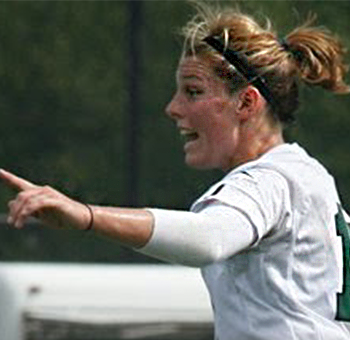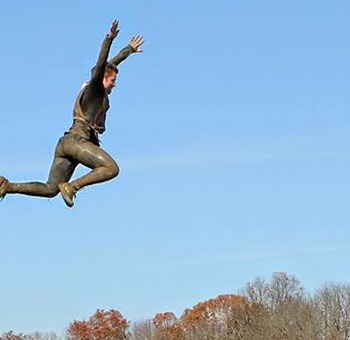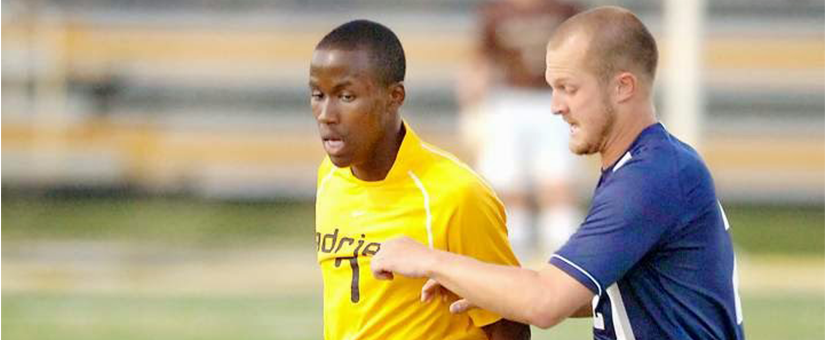
How a Mental Skills Program Helped One Player at a Professional Tryout
The Value of Mental Skills Training in Collegiate Soccer (Part 2 of 3)
Part 2: Cazz Warren
In this three part series we take a look at how three former collegiate student-athletes benefitted from a structured mental skills training program in their sport performance, injury rehabilitation, and life.
In Part 2 we talked with Cazz Warren, a former D1 college soccer player about how adding a mental skills program to his training helped him grow and gain the confidence to push for new levels. The outcome of this growth was a series of tryouts for pro clubs in England.
Cazz Warren
Current Job: Sales Rep for Streamlink Software (aspiring Pro Soccer Player)
Former D1 Soccer player
Awards: All Tournament Team, All League Second Team, 2 All-League Player of the Week Awards, Team Leading Scorer and Team MVP
Derrek Falor (DF) – Talk to me about what you’ve been up to this past summer.
Cazz Warren (CW) – I recently returned from England on trial at English sides. I originally went to England for a month long trial with Mansfield Town FC in the Football League 2, and was able to create a couple of other trials with Mansfield FC’s non-league side and Sherwood FC as well. I trained anywhere from once a day to twice a day, gaining great game and training experience while over there.
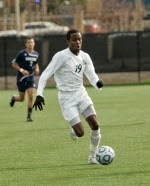
DF – That’s an incredibly busy few months with the overseas travel and multiple tryouts! What did you learn from those tryouts that you wish you had known during your college playing days?
CW – I really found out about the importance of a personal and individualized on-field performance script! I did not have this or know how to do this for myself in college. More often than not during training and games in college I was talking myself out of something. Through mental training my script has gone from “I don’t know” to “okay Cazz you need to do X to get Y… I know you can do it”. I now have trigger words that help me to refocus my thoughts, phrases I use to get myself into game mode, and breathing techniques to stay composed.
DF – So what led you to add a mental training program to your training regimen?
CW – Largely because of the opportunity of going to Europe and the challenges I knew I would be facing once I got there. I felt that I would need to create an incredibly positive view of myself as a player so that I could handle whatever was coming my way with the Mansfield FC opportunity. Before incorporating a structured mental training regimen, I would have inconsistent matches and training sessions and always have a different reason which contributed to my performance levels. Some variables I knew I could control but didn’t know how to deal with, and other things just knocked me off my game and made me feel frustrated no matter what I did. I let weather affect me, opponents, just a lot of things. I was so unfocused, all of the time!
DF – As you were preparing for your tryouts in England, what parts of your game did you most focus on?
CW – Certainly my fitness, getting as much time playing as possible and mental training. I worked on using breath control, visualization, and my reparative script for mistake recovery. For the first three months of my prep I was just doing things on my own before beginning work with a mental training program. On my own I was just so oblivious to the positive benefits of training my mind. I thought I could just get out on the field and work and my game would sharpen up. After beginning work with mental skills I was blown away by how I had gone so long unaware that I can improve my game through training my mind, I refuse to go back to not expanding my mental capabilities and myself.
DF – I watched you grow in confidence from week to week. What do you think specifically is responsible for that growth?

CW – The awareness of my own game and the small variables that I learned how to control. I learned how to ask questions of myself, like ‘why was I doing something exactly that way’. By taking a step back and really looking at how I approached playing, light bulbs started going o. I can still remember you simply asking me questions about something and my previous approach to it that made things click. After the light came on we’d discuss how I was currently doing it and then we would be able to find the best way for me to excel at a skill. Like targeting. Just learning how to use imagery and see myself with some adjusted body mechanics completely helped my first touch. In three months I grew more than I did in college over 4 years! The things that contributed most to my confidence were my breathing techniques, visualization, and the script I created that would allow me to draw on my own best performance every time I played. That alone makes my confidence rise every time I step on to the field.
DF – Once you hit the field over there, what stood out to you? What elements did you feel like you had to bring strongly to the field every session?
CW – I knew quite early my mental training routine would need to be on repeat. In a group of trialists you are able to assess others players mentalities and confidence towards the game. Work rate was the top element, as it was their pre-season so I had to be ready to out run, out tackle the players all the time or there would be no hope to stand out or get my opportunity. I found I needed to learn how to press through discomfort and fatigue. And before every session I would go through my defensive script of how I wanted to defend every time I was on the pitch, no matter the opponent.
DF – During those first few training sessions with Mansfield FC, what did you notice about how the players as a whole tended to respond?
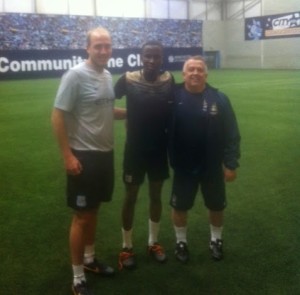
CW– After the first training session I could see the other players beginning to be frustrated with their performance, the hotel, and the coaching staff, whatever. All things they could not control, and they just kept using these things as excuses for how they played. I felt lucky that I already knew how to focus my efforts on things I could control.
DF– Can you tell us about the biggest challenges you faced while on trial? Any types of players, situations, or coaches that were interesting challenges to face?
CW – Absolutely! The biggest challenges were other players not passing me the ball, and also injuring my toe in training, and a coach who refused to take an honest look at me. It is so frustrating when other players won’t play you the ball because you’re trying to take their job, where you have to then work harder to create your own opportunities and capitalize. I had to be so tough-minded to deal with this. During a session 6 days into the month-long trial I had the same center back on a scrimmage team step on my injured toe three times causing me a good amount of pain for the last few weeks I was over there. Having to focus through daily pain and still play effectively was a huge challenge. Lastly there was one coach who was not happy about having a trialist during the pre-season and was disinterested in giving feedback after sessions.
DF – What are some of the things you have learned based on going through a structured mental skills training program and how it enhanced your game?
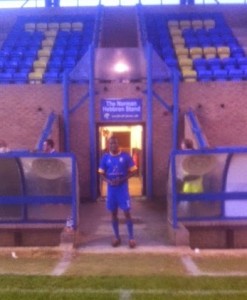
CW – After regular mental training sessions, I was able to identify weakness in my performance, refocus using breathing techniques, how to better analyze the amounts of information I was receiving, and to not worry about the uncontrollable elements. I also learned how to manage the obstacles I can control with a mental script and how to focus my efforts on the best of my abilities.
DF – Tell me about some of the specific ways you now prepare for a field session.
CW – I review my mental script of what I plan to do every time I step on to the pitch both offensively and defensively. I visualize what I plan on doing so that I will have done those things many times in my head and feel comfortable with stuff long before I touch a ball. I now see myself playing each day before actually going to training. I go over the four key strengths I need to bring to the field to be able to perform at a high level, I use imagery to see my off-ball runs, I use cue words to help me remain calm in tight spaces, I make sure I have a plan on how to react with things do not go as planned. And I always start with the confidence that even as an attacking player I can effectively use my defensive strategy we developed to make the game simpler. All of these things help me to stay in the moment.
DF – It’s amazing to see how much more confident you are now as a player!
CW – Totally. My game has grown immensely and I am way more confident in many aspects, more consistent, and less emotional, all of which were problems before. I now know that I have a strategy to impact a game or training session no matter what challenges pop up.
DF – Looking ahead, how will you keep incorporating regular mental skills work into your training?
CW – I won’t go backwards because I know how far I have come! In every aspect of my training I visualize what I want to accomplish, I use my performance scripts to achieve things on the field, and even during the day I use breathing techniques to calm myself. I also now know how to debrief myself post-session and reflect on what was gained or what I could have done better.
DF – To those other college players who are working towards becoming a pro player, what would you tell them they should work on most?
CW – To make sure that their mental aspect is practiced and taken care of and that they can always control their work rate. All players really should have a mental plan! Understanding how the thoughts you have can either help or hurt you, your mentality towards various situations, learning about what you can control, all will go a long way to making the intense training become manageable. All pro clubs will always look for confident and focused players because they know these players have drive, willingness, and dedication to playing hard and getting better.
Stay tuned for Part 3 of this 3-part series on how another former college soccer player used a mental skills program as a competitive Muay Tai fighter and currently relies on her mental toughness to compete in hyper endurance events.
Derrek Falor. M.Ed.
[email protected]
www.thrivesp.com
@derrekfalor
Derrek is the owner of Thrive: Excellence in Sport Performance, has coached college soccer for the past 20 years, has a USSF A License, is a member of the Association for Applied Sport Psychology, is undergoing professional certification through AASP, and has a Master’s Degree in Sport Psychology.
- sport in a pandemic: Crisis or opportunity?Chapter 4 - December 4, 2020
- Crafting the Perfect 10: - November 6, 2020
- Sport in a Pandemic:CRISIS OR OPPORTUNITY?Chapter 3 - September 23, 2020

